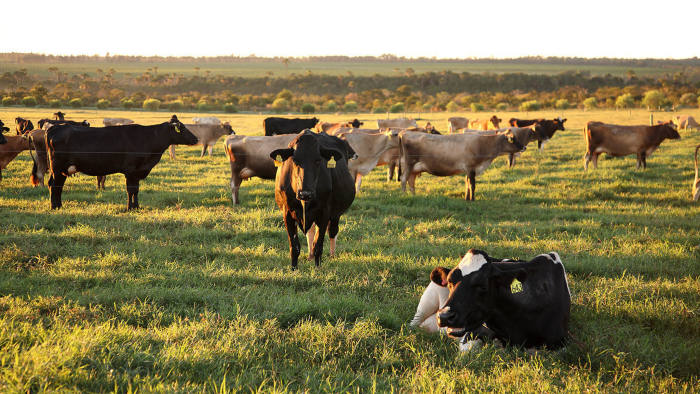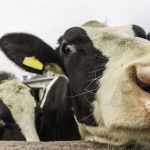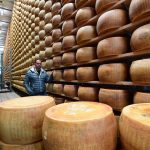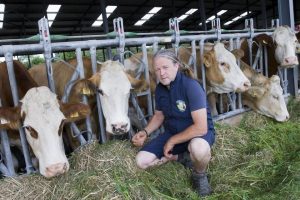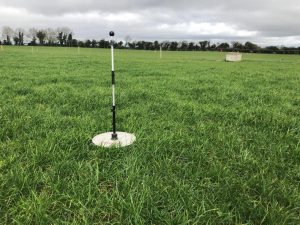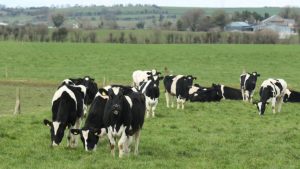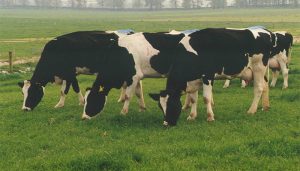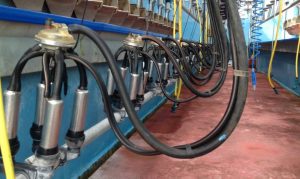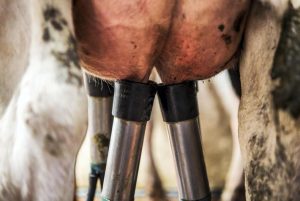
He’s now spearheading an initiative to get up to 120 west Kerry dairy farmers to invest in energy-saving technology which he says will save them thousands and make their farms more sustainable.
It all started on a fine summer’s day two years, says Dinny: “I was in the milking parlour and happened to walk into the plant room. Jeez, the heat that was coming out the door would knock you. It was from the fan sucking in the air to cool the gas to make ice for the milk tank.
“I said, could we not do something with that heat instead of blowing it out the window?”
He had installed an air-to-water heating system in his house in 2004 and noted that it could provide the solution.
Having done some research, Dinny discovered that DeLaval manufactured a similar system.
“Instead of cooling the gas with air you can cool it with water, but in turn, it heats the water,” he explains
At the time Dinny also needed to replace the compressor in the parlour and was eligible to receive grant aid for the investments.
“The whole job cost €6,000 and the grant came to €3,000 so you could say I got one of them for free. “However, now when I cool my milk, I have 500 litres of water at over 50 degrees.”
Using this system, the water can be further heated with electricity to the correct temperature for cleaning, and for domestic heating if the house is close to the milking parlour.
The success of his investment got Dinny thinking. Also an AI man, he visits farms all over west Kerry for his work and he was sure many of them could benefit from doing something similar.
At this point he was well versed in renewable technologies, having also installed solar panels; last year he was appointed an Energy Ambassador for the ESB Networks’ Dingle Project, which is organised by the Dingle Hub. He has also trained as an ‘energy mentor’ with the Dingle Hub, a community enterprise and innovation centre.
There are 120 dairy farmers in west Kerry and Dinny says most of them can benefit financially by adopting these energy-saving measures.
He has established a Sustainable Energy Community (SEC) which will examine ways in which dairy farmers can reduce their energy costs as well as generating electricity on their farms.
The west Kerry dairy farmers SEC provides “great possibilities ahead for the farmers on carbon reduction inside their own farmyards,” says Dinny.
Initially, they will focus on three areas:
– the use of heat exchangers to re-use the energy generated when cooling milk;
– the installation of PV panels on the large roofs of farm buildings;
– the installation of more energy efficient variable-speed vacuum pumps and motors in milking machines.
On the last point, Dinny says: “This would mean if you were only milking three cows, the motor wouldn’t have to be running flat-out.”
Most of the farmers are very interested in the project and they will be able to benefit from both grant aid as part of the SEC and the purchasing power of a large group.
Having got the green light for the SEC, Dinny says the next step is to develop an energy master plan which will involve an engineer coming onto each farm and assessing where savings can be made.
“All our farms are different and the solutions will be different based on the farm,” he says.
Carbon neutral
While the farmers will make significant savings on their electricity bills, the environmental benefits are also important.
“What are really doing is going a way to make our farms carbon neutral,” says Dinny. “These are four simple steps that can be done inside the gate of every dairy farmer, but if a man could only do one, it would still be great.”
Dinny says his pitch to farmers is simple: “I heat the house and water for just €500 per year, and the solar panels have created almost 2,500 units of electricity in the last year.
“All I say to people is, beat that,” he says.
‘Myself and Danny Healy-Rae wouldn’t get on – I don’t agree with his views on climate change’
Energy and electricity always interested Dinny Galvin, and finding ways to save money on them has been a lifelong passion for him.
“I had only one year in secondary school. My dad passed away when I was 16 and I had to jump into his wellingtons straight away,” he says.
“My mother was alive at the time and I had two sisters who needed to be supported. I just had to put the head down and plough on.”
When he took over from his father, Dinny was milking eight cows in a tie-up byre and had about 30 ewes.
Over the years he built the herd up from 8,000 to 50,000 gallons, having invested a lot of money, time and effort in the farm over the years.
“I’m well able to build a stone wall for you,” Dinny says, recalling his time in the construction sector.
“I was at that in the boom times and did quite well, and it helped me to buy quota.”
Farm accident scare
However, it was a scare with a potential farm accident that led him to his most recent career move as an AI technician.
“My cows have to travel on the public road for milking and one evening a neighbour was walking nearby and the bull lost the head,” he says.
“Thank God no one was hurt, but I brought him down the following day and I said ‘you ain’t going on the road again’.”
The scare prompted Dinny to enroll in an AI course and after breeding his own herd for several years, he started working for Dovea Genetics.
Through his work he meets farmers from all over the Dingle Peninsula and he says most are willing to make changes on their farms that could benefit the environment.
“If you sit down with a bunch of farmers and talk to them, they’ll work with you. If you dictate to them and tell them you have to do A, B, C and D they’ll turn off you,” he says.
Dinny says the negativity towards farmers about green issues upsets him and he believes most farmers would have no issues taking some environmental actions.
“Myself and Danny Healy-Rae wouldn’t get on for five minutes. I don’t agree with his views on climate change,” he says.
“Agriculture is contributing [to greenhouse gas emissions]. He’s mad to be saying we’re not, but farmers can do something about it.
“I’ll put my had up and say ‘yes, we are contributing to it’, but we are not doing the big damage. There are corners on every farm where these things are possible.
“Farmers are custodians of the land – they just need to be incentivised and helped. Individually on every farm, fellas need to take stock of things.
“We need to be sustainable because we are trying to sell our product on a world market.”
However, Dinny is very much against a cull of the national herd in order to meet climate change targets. He believes that huge strides can be made to reduce the environmental footprint of farms without such a drastic measure.
Nevertheless, he says some of the dairy expansion that has taken place in recent years has been extreme.
“I see 150 cows now where there was once only 50. That’s nearly a three-man job, but I see lads trying to do it on their own. They are putting huge pressure on themselves,” he says.
Dinny also laments the state of the beef sector which he says could have much to gain from new energy technology – solar panels could offer much-needed additional income for these farmers.
“PV panels are a must on dairy farm, but they could work for beef farmers too. People forget that farmers have the roof space,” he adds.
‘Myself and Danny Healy-Rae wouldn’t get on – I don’t agree with his views on climate change’
